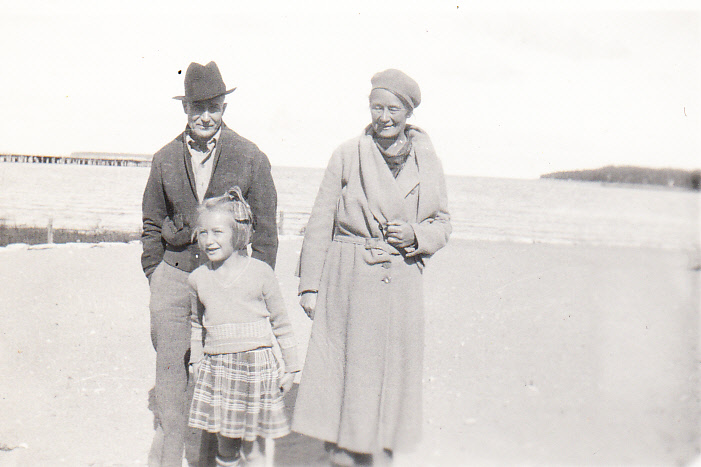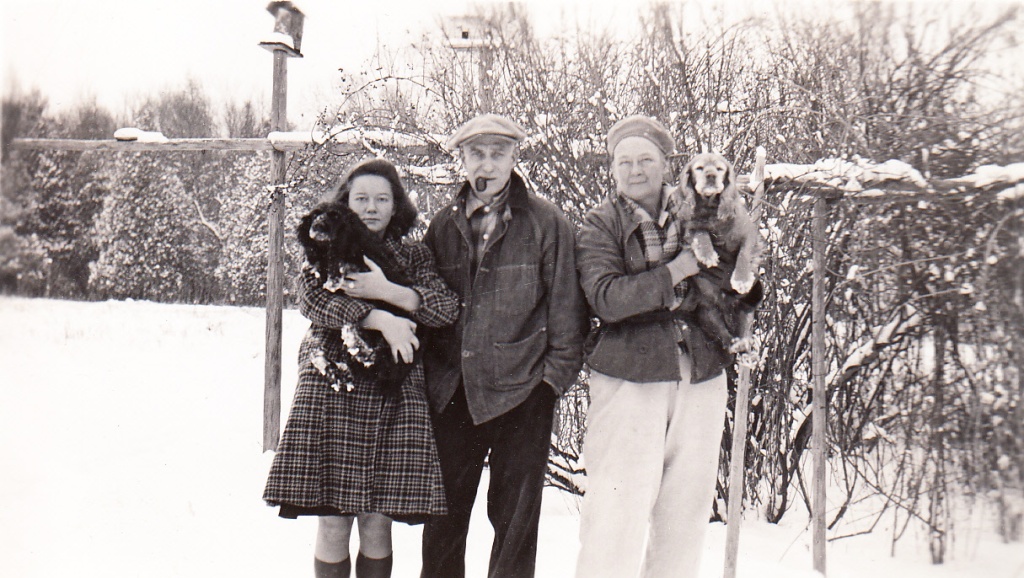Unfortunately, due to the lack of written material throughout the 1930s, Mata’s story must be fast-forwarded more than a decade. When we last left off, she got married (1927), moved to Chicago with her new husband, Ben, and her only child, a daughter named Barbara, was born (1928). We can assume that most of her time in the 1930s was devoted to being a mother. She had retired from teaching for good, and her husband’s job at a big bank was good enough to keep them at least somewhat comfortable for a while, though later on, there would be financial troubles. One notable event in this interim period is her mother dying in 1933. Not much is known about Caroline, but Mata had characterized her as a gentle soul, and she must have been distraught at losing her second parent.
At some point, Mata was living in Two Rivers again, perhaps it was shortly after her mother died. Mata’s uncle, Ed, seemed to be looking after the farm, so it’s unclear why she returned. During that time, Ben stayed at his bank job in Chicago, though did some to visit when he could, and Mata also came to visit Chicago sometimes, but this distance must have put a strain on their marriage and their family dynamic. There was a bizarre incident involving Ben in March 1942, where he said he was beaten and robbed in Chicago, having a watch given to him by Mata stolen along with some cash, and having 5 teeth knocked out in the process. What makes it bizarre is that Mata and other people in Two Rivers didn’t seem to believe it. Mata eventually came around to believing him, but still held some doubts. She wrote:
“Don’t know why it is but no one in T.R. takes Ben’s story of robbery seriously. I did not at 1st—because his eyes—always show that he’s had something + those deep seated colds—he had years back. But I can’t doubt him—he’d hate that. But why don’t people seem to take his hold-up seriously, I guess because he did not repent robbery formally at police station. Yes, the 2 things I wanted him to have—good—his watch + his fountain pen. All gone—never to come back. Why did he not tell Wold or his mother—or no one else? And Wold hangs around toughest joints and never has lost a thing—except money—but I guess he doesn’t know a watch or a pen—because he frequents tough joints. His money he throws away—no one need rob him. If Ben really did drink as he used to years back—it’s partly our fault—me here—he there—The only thing I try to show him better things better clothes—etc. I try to compensate in other ways.”


Mata’s surviving diaries pick up again at the very end of 1941, only weeks after the United States had officially entered World War II. Despite this, the diaries start off with a positive moment. For the first time in 8 years, Mata, Norbert (her brother), and Leatha (her sister) were all together at the same time. The diaries are significantly less well-written than they had been more than 20 years previously, with choppy, incomplete sentences, and don’t usually provide much insight into her thoughts as they once had. It is unknown if she wrote any other diaries that were lost over time, or if she had simply stopped writing them for many years, but nonetheless, they can still help to fill in the gaps a bit.
With American’s entry into the war, pacifism declined sharply. In between Germany’s invasion of Poland and the attack on Pearl Harbor, there were a considerable number of Americans who advocated isolationism. Despite this new turn of events, Mata remained one of the few ardently against war, though not for nationalistic reasons. Her reasons for thinking the way she did are open to interpretation, but I personally think it at least partly has to do with her German heritage. Throughout her life, Mata was proud of her German ancestry. She visited the country and kept in contact with her German relatives. Her parents, though American-born, spoke fluent German around the house, and all three of their children communicated with them in German. In those days, when there were such strict divisions between groups of people based on their heritage or ethnicity, Mata sometimes seemed to identify more with her German heritage than her American nationality. Of course, with such a strong attachment to Germany, she was certainly not enthusiastic about fighting it. There is no direct glorification of the Nazi regime or Hitler, but there are a number of times where Mata rails against American President Franklin D. Roosevelt and British Prime Minister Winston Churchill. The exact nuances of her position on the war and Germany during this time are not clear, but there are a few short moments that might provide some clues.
In late December 1941, she seemed to take a neutral position, writing: “Yes, the planet is in throes of another war. I needn’t choose sides. I shall be a snob when it comes to that. Aloof—I ask only to be left alone.” A few months later, she simply vents her hatred of war in general: “Father Hubbard—a word from him as to a real cause of this disease—we call war—would go far. But war + religion doesn’t mix at all.” She also disdained American propaganda films. For example, she accused the 1944 Hollywood film, “Tomorrow, The World” as “a rotten thing” because of its supposed “hatred for German children.” At this early stage in the war, Mata already detested President Roosevelt, which is evident in one entry where she is angry that Ben’s salary as a postal clerk had been reduced: “Nice going the postal clerks by oath can’t strike—so so easily Reverend Roosevelt—Dictator—can veto this raise.” Shortly after FDR’s death years later, near the end of the war, she wrote: “Hateful propaganda Pathe film…So the negotiated peace advocated by F.D.R. feel [fell] asleep + Japan + Germany 2 great cultures with bread hungry million are beaten to a pulp + we call it a day.” And nearly in the same breath, she directs her biting comments at Churchill: “And Churchill blares out—peace not until he, the Almight[y] Lord God of Hosts, Earth born announces it.” It seems that even the end of the war in Europe didn’t relieve Mata of her hatred for the two leaders. To her, they carried the war in Germany to excess and were its destroyers. Interestingly, she makes absolutely no mention of the Nazi regime and its role in Germany’s destruction during the war. What this omission means is up to interpretation.
While her attachment was to Germany, Mata also mentioned Japan as well, once reading a book about it and writing out some quotes. She had a habit of romanticizing countries and cultures, and was also sad to see the destruction of yet another country with a rich history. Even before the atomic bombs were dropped, she wrote: The beautiful cities of Japan are gone. We have become worse than they.” So it seems that she recognized some of the violence Japan had committed, but put the U.S. on the same level. And with the final end to the fighting in August 1945, Mata was still moody about the whole thing, and did not take part in any of the celebrations, and made her stance on the Allied Powers very clear: “Noisy streaks on the road—as people celebrate—temporary end of world war II atomic bomb + Russia—2 factors in stoppage of yellow fight. So 2 dead countries commercially + culturally extinct. The U.S. Britain + Russia—3 triumphant kings sit like vultures—satiated with the spoils.”
It should be noted that all of the things she wrote about the war, about Germany, Japan, Roosevelt, and Churchill were few and far between overall. Most of the pages of these 1940s diaries are filled with the tedium of farm life, small social gatherings, and updates on family members and friends. While the war was on her mind at times, she devoted far more time and energy on doing her daily routine. Mata’s feelings toward the war, whether you find them to be unpatriotic, harsh, or just wrong, it is an interesting example that went against the general consensus in the U.S. at that time.
The war seemed to have another effect on Mata. In a December 1945 letter to a relative who was being held as a prisoner of war from Germany, she explained her updated attitude towards Christianity:
“I don’t pretend to be much of a Christian—I guess because Christianity apparently means war and hate and atomic bombs and starvation of innocent children and revenge—I guess that is why I should not be flattered if anyone should ask if I were a Christian—but since I am what I am—vaguely it seems to me I remember that Christ said something about forgiving a fallen enemy—Christ said something about turning the other cheek, Christ said something about revenge being more dreadful than the crime preceeding [sic.] it—and above all Christ said something about love one another—but I suppose he was just talking and it really doesn’t mean anything—or does it?”